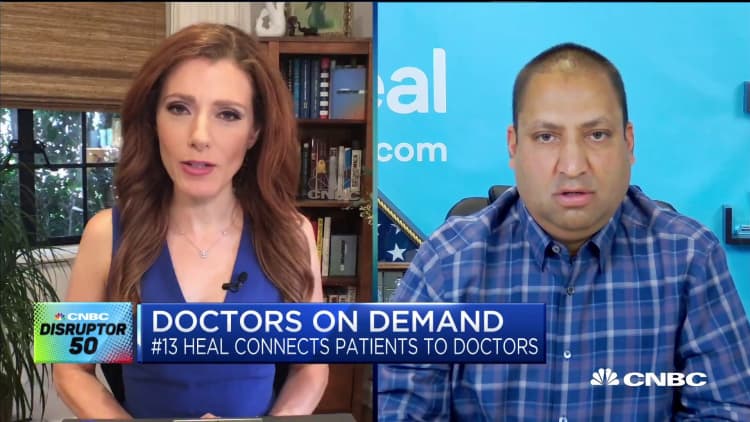When Lionel Richie and Jeb Bush invested in five-year-old start-up Heal, they knew America was ready for a paradigm shift in the way health care was delivered. So many Americans were homebound and couldn't visit doctors' offices, and many didn't have the money to spend on expensive medical tests, procedures or emergency rooms. Now the shift has been accelerated by the coronavirus pandemic.
Today the start-up that provides an Uber-like doctors-on-call service, along with telemedicine, is riding a wave of burgeoning demand due to Covid-19 concerns. Since January, home visits have gone up 33% and telemedicine appointments have risen 8,000%. On Tuesday, Heal garnered the No. 13 spot on CNBC's 2020 Disruptor 50 list.
The back-to-the-future model is simple: Doctor services are delivered to a patient's home on demand through an app. Users input their personal medical details and credit card information and request a doctor in their local area. "It's like a concierge service for health care," according to Lionel Richie, who invested in Heal at the company's seed stage. "A board-certified primary-care physician and medical assistant make a house call within two hours of a request," he said.
The average visit lasts 30 minutes to one hour, and Heal doctors come with a medical assistant and a host of portable testing machinery to perform everything from an EKG, ultrasound and bone scan to blood testing and allergy screening. They also get a firsthand look at the patient's living conditions and access to food and prescriptions they need to stay healthy.
On the telemedicine side, the platform can be accessed through any browser without any app, download or third-party software. The company has a Heal Hub that provides real-time monitoring of key vital signs such as blood pressure, blood sugar and heart rate. It is being heavily used by seniors and those with chronic conditions like diabetes and hypertension. Covid-19 patients are also using it to track pulse and oxygen levels as a proxy to determine breathing and the need for hospitalization.

"Since the start of the coronavirus, people have been avoiding doctors' offices like the plague," says Nick Desai, co-founder and CEO of Heal, noting they are avoiding everything from pediatric follow-ups for their children and disease management to annual checkups. "They are saying, 'Unless I am dying, I am not going to the doctor.'"
Heal has been filling that void, and last month it launched a Heal Teletherapy service for those suffering from anxiety, fear, depression and other mental health issues during the crisis. Licensed clinical psychologists provide the video-chat service now in California. The cost is $69 for a 20-minute session, and many employers are covering the costs through their benefit plans. It will roll out to other markets in the U.S., including New York, New Jersey, Georgia, Washington State and Maryland on Aug. 1.
Desai says it's being used by many groups of people: those with Covid-19 stress syndrome afraid of losing their job or dying, ethnic minorities afraid of police violence, and teens dealing with isolationism and fear. "The Black Lives Matter protests have made Americans even more insecure right now," says Desai. "Many Blacks, Hispanics and other minorities are afraid for their teens' safety."
In support of Black Live Matters, Heal is offering free telemedicine visits through June 22 to those with no health insurance.
According to Desai, Heal primary-care doctors and Heal psychologists work together hand in hand to coordinate and optimize care plans for the best outcomes across patients' physical and mental health.
More from Disruptor 50:
Moderna CEO sees success with Covid-19 vaccine
The technology that will dominate daily life on the other side of coronavirus
CLEAR poised to lead in biometric screening for Covid
Heal's telemedicine and home-visit services are in-network with all major PPO insurance companies as well as Medicare.
So far this year the company has had 30,000 house calls and 15,000 telemedicine appointments. Last year it had more than 100,000 house calls, averaging $53.7 million per year in overall health-care savings. It expects the same number of house calls by year-end and 53,000 telemedicine appointments. There are currently 150 American Board-certified physicians, nurse practitioners and clinical psychologists in the network across its markets.
Activision Blizzard has been using Heal as a health-care partner for four years for its workforce and their families around the country. "It's been a great comfort to those in need," says Bobby Kotick, CEO of Activision Blizzard. "Since the Covid-19 pandemic began, they quickly expanded their services and reach to ensure priority access to telemedicine services as well as facilitating testing seven days a week." As he explains, it has helped the company navigate the impact from the virus and lead its return-to-work process.
To date Heal has raised $100 million in venture capital. The company's largest investors include Fidelity, Breyer Capital, Paul Jacobs (current Heal chairman and former chairman and CEO of Qualcomm), IRA Capital, Trans-Pacific Technology Fund, Lionel Richie and U.S. Ambassador Jamie McCourt. Jeb Bush is also an investor and board member.





